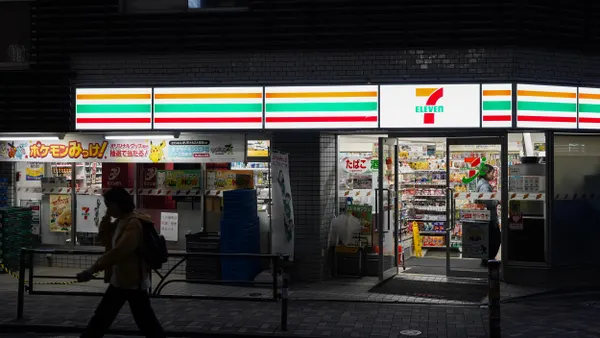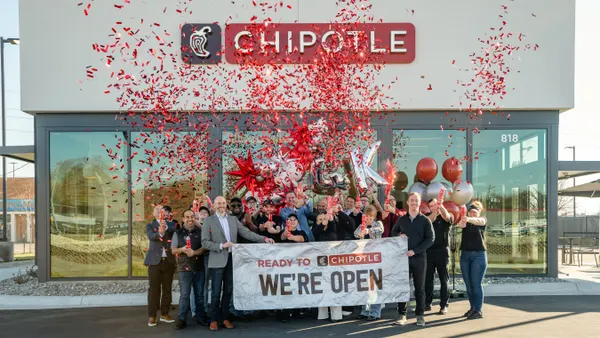Dive Brief:
- Chipotle continued its steady rebound in the third quarter, posting 8.6% revenue gains to reach $1.23 billion, which aligned with analyst expectations. Same-store sales rose 4.4%, a hair under Wall Street estimates of 5% growth, the company reported on Thursday. Check averages were up, too, but CFO John Hartung cautioned that these wins likely stemmed from menu price increases, rolled out in April 2017 and completed in January. Store traffic slowed about 1%.
- So far in 2018, net income has improved since last year, increasing 9.1% from $132.5 million to $144.5 million.
- Digital sales provided an extra bright spot, jumping almost 50% to comprise more than 11% of total sales. This boost comes about five months after the company made a $135 million investment to speed up the its mobile and online orders, close around 65 struggling locations and launch its "For Real" marketing campaign, which highlights the quality ingredients in its food.
Dive Insight:
Chipotle's Q3 report didn’t offer exact financial estimates for the remainder of 2018, perhaps a sign of caution in a tumultuous time for the brand.
Still trying to shake the blowback following several foodborne illness outbreaks — a problem that's plagued the chain since 2015 — Chipotle managed to emerge from the third quarter relatively unscathed by yet another outbreak in August. Unsafe food temperatures sickened more than 600 people in Powell, Ohio, leading CEO Brian Niccol to promise staff retraining on food safety and wellness procedures. That same week, the company’s National Guacamole Day mobile app promotion stumbled due to a technical malfunction.
Yet third-quarter sales, revenue and net income all managed to increase, thanks in large part to menu price hikes up to 7%. That’s a huge improvement from last year at this time, when net income landed at $19.6 million due to a July norovirus outbreak linked to a Virginia store, compared to $38.2 million this year. And with the recent announcement that head of food safety James Marsden will retire, Chipotle’s future might need even more fresh faces.
Since dropping founder and CEO Steve Ells late in 2017, the burrito chain also lost its CMO in March, just days after Niccol took over. In addition to slight menu hikes, Niccol has overseen a mostly positive performance streak in his first year on the job since coming from Taco Bell. Per the most recent earnings report, Chipotle has opened 97 restaurants in 2018 while closing or relocating 42, hitting a majority of the 65 underperforming shops he pledged to close.
Chipotle is also trying to stand out in the fast casual market with a new advertising campaign focused on its fresh ingredients, which the company says makes the company's kitchens more complicated than many of its quick-service counterparts.It’s addressing those intricacies with a $135 million investment in marketing, more training and a second-line for digital orders, which have soared to nearly 12% of total sales. Customers can also pick up digital orders in a set-aside space, further speeding up service, and can enroll in a point-based loyalty program that offers a free entree for every $125 spent.
Analysts point to these digital upgrades as belated but essential to the brand’s future, and stock interest has peaked accordingly, according to MarketWatch. Royal Bank of Canada also found that Chipotle remains a top-three favorite quick-service brand, and a majority of customers surveyed would consider visiting to try a new item. Continued innovations for the company's menu and digital offerings will no doubt be key to future growth, and fellow Taco Bell vet Chris Brandt, brought in as CMO earlier this year, will likely help that cause.










